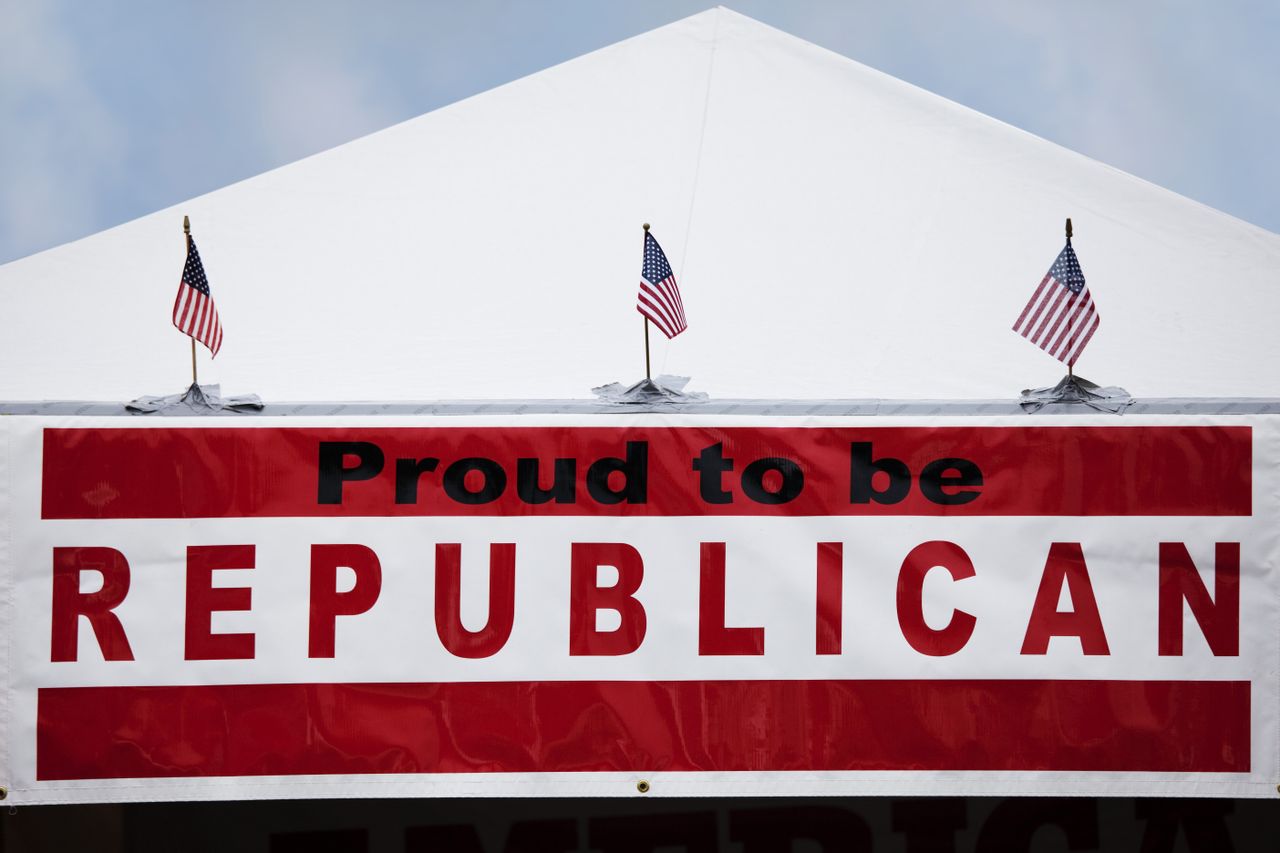Can the Republican Party win back its own base?
Here's why conservatives cheer Trump's disloyalty


There was a time not too long ago when Democrats looked on jealously as the Republican Party acted as one smoothly functioning machine. In this veritable political monolith, members used the same language, shared the same agenda, and united in common effort whenever power was on the line. There were divisions within the party, of course, but they were subsumed within a larger endeavor, one all concerned understood to be more important than their differences. It was only a few years ago, yet today it seems like a distant memory, the GOP seemingly more fractured and complex than ever before.
The presidential primary campaign, which is supposed to unite the party behind a leader, has exposed and exacerbated these divisions to a fascinating degree. And even if no one predicted the success of Donald Trump, the most significant force currently fomenting party discord, it was foreseeable that this campaign would be anything but smooth.
When Barack Obama took office — literally on the evening of his inauguration — Republican congressional leaders gathered for dinner and decided that they were going to pursue a strategy of total and complete opposition to the new president. From a short-term political perspective, it was undeniably effective: They prevented Obama from doing many things he would have liked, and for all the talk of "obstruction," they still won the House in 2010 and the Senate four years later. But in the process, they also created an expectation of potency that, because of simple institutional facts, was impossible to live up to.
Subscribe to The Week
Escape your echo chamber. Get the facts behind the news, plus analysis from multiple perspectives.

Sign up for The Week's Free Newsletters
From our morning news briefing to a weekly Good News Newsletter, get the best of The Week delivered directly to your inbox.
From our morning news briefing to a weekly Good News Newsletter, get the best of The Week delivered directly to your inbox.
As the party moved to the right and moderates were purged, the demands from their base increased. It wasn't enough to oppose Obama, Republicans in Congress had to shut down the government, promise to repeal his achievements, and generally act as though if voters gave them a hand, the next election would bring his downfall. When it didn't, those voters inevitably got disappointed.
So even though their party controls Congress, Republican voters are as disgusted with the institution as anyone. When the Pew Research Center asks people what kind of a job their party is doing standing up for its traditional positions, Republicans score terribly — in the latest poll, only 27 percent of Republicans said the party was doing an excellent or good job (compared to 44 percent of Democrats saying the same about their party). The party leaders have confronted this dissatisfaction directly in the form of Trump: every time he displays disloyalty — like failing to pledge not to run as an independent, or blithely stating heretical positions on policy issues — they hope his supporters will turn away, but they don't. When Trump says he'll make sure Social Security, Medicare, and Medicaid (yes, Medicaid!) don't get cut, party leaders' heads nearly explode. Could it be that fighting to cut those entitlements and slash the size of government isn't quite as important to the rank-and-file as it is to the party's elite?
The truth is that standing up for their positions hasn't been the problem. Republican leaders have been "standing up" like crazy, but standing up is the easy part. They stood up to vote to repeal the Affordable Care Act more than 50 times now; their problem is that the law is still intact, all that standing notwithstanding. They can stand all they want; what they haven't been able to do is deliver anything of substance to their constituents. That may be the inevitable consequence of being the opposition party, but when Trump comes along and says he'll "get things done," pretending that opposition and practical complications are as nothing to the overwhelming force of his will, a healthy portion of Republican voters are smitten.
In fact, if you add up the support given to Trump and the other "outsider" candidates, depending on the poll you're looking at you'll wind up with a majority of Republican voters. At the moment, Ben Carson — who if anything knows even less about how government actually works than Trump does — is running in second place. Carly Fiorina seems to be gaining support, and the most anti-Republican Party of the politician candidates, Ted Cruz, is one of the few who hasn't been undercut by Trump's rise.
That doesn't mean that one of those boring party loyalists won't eventually be the nominee; that's where I'd still put my money, despite all that has happened. But let's say that happens, and someone like Jeb Bush, Scott Walker, or Marco Rubio ends up being the nominee. To many Republican voters — maybe even most of them — it'll look like they've already lost.
Sign up for Today's Best Articles in your inbox
A free daily email with the biggest news stories of the day – and the best features from TheWeek.com
Paul Waldman is a senior writer with The American Prospect magazine and a blogger for The Washington Post. His writing has appeared in dozens of newspapers, magazines, and web sites, and he is the author or co-author of four books on media and politics.
-
 The sweet smell of excess: how fatbergs make perfume
The sweet smell of excess: how fatbergs make perfumeUnder The Radar Scientists are turning the horror blobs of the sewer into fragrant scents
By Chas Newkey-Burden, The Week UK Published
-
 The Week contest: Robotaxi review
The Week contest: Robotaxi reviewPuzzles and Quizzes
By The Week US Published
-
 Magazine solutions - January 24, 2025
Magazine solutions - January 24, 2025Puzzles and Quizzes Issue - January 24, 2025
By The Week US Published
-
 US election: who the billionaires are backing
US election: who the billionaires are backingThe Explainer More have endorsed Kamala Harris than Donald Trump, but among the 'ultra-rich' the split is more even
By Harriet Marsden, The Week UK Published
-
 US election: where things stand with one week to go
US election: where things stand with one week to goThe Explainer Harris' lead in the polls has been narrowing in Trump's favour, but her campaign remains 'cautiously optimistic'
By Harriet Marsden, The Week UK Published
-
 Is Trump okay?
Is Trump okay?Today's Big Question Former president's mental fitness and alleged cognitive decline firmly back in the spotlight after 'bizarre' town hall event
By Harriet Marsden, The Week UK Published
-
 The life and times of Kamala Harris
The life and times of Kamala HarrisThe Explainer The vice-president is narrowly leading the race to become the next US president. How did she get to where she is now?
By The Week UK Published
-
 Will 'weirdly civil' VP debate move dial in US election?
Will 'weirdly civil' VP debate move dial in US election?Today's Big Question 'Diametrically opposed' candidates showed 'a lot of commonality' on some issues, but offered competing visions for America's future and democracy
By Harriet Marsden, The Week UK Published
-
 1 of 6 'Trump Train' drivers liable in Biden bus blockade
1 of 6 'Trump Train' drivers liable in Biden bus blockadeSpeed Read Only one of the accused was found liable in the case concerning the deliberate slowing of a 2020 Biden campaign bus
By Peter Weber, The Week US Published
-
 How could J.D. Vance impact the special relationship?
How could J.D. Vance impact the special relationship?Today's Big Question Trump's hawkish pick for VP said UK is the first 'truly Islamist country' with a nuclear weapon
By Harriet Marsden, The Week UK Published
-
 Biden, Trump urge calm after assassination attempt
Biden, Trump urge calm after assassination attemptSpeed Reads A 20-year-old gunman grazed Trump's ear and fatally shot a rally attendee on Saturday
By Peter Weber, The Week US Published